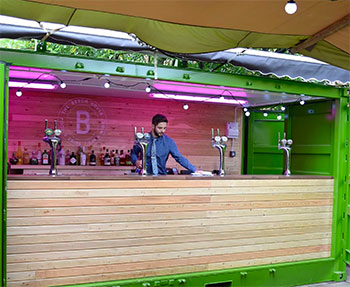As a startup business owner or entrepreneur looking for their first venture, hosting your first business event can be equal parts nerve-wracking and exciting.
With so many marketing channels and avenues available to business owners, many rightfully recognise the value of networking, building a firm online presence, developing strong partnerships, and using innovative tools like AI.
Events, however, are a different kettle of fish entirely. Whether it’s a product launch, a milestone achievement, a networking event featuring potential clients and referral partners, a conference, a trade show, or any other occasion, a well-planned and well-executed event can drastically improve your business profile.
A recent study by Splash found that 60% of companies that host events in person find them effective at generating revenue, which, for startups, is crucial, especially in those first few years.
Whatever the occasion, hosting and arranging your first event as a business owner can be a challenge. However, with these essential tips, you can ensure your inaugural event gets off on the right foot and serves as a valuable asset to your wider business efforts.
1. Define Your Target Audience and Event Objectives
Before diving into the deep end of logistics and planning, it’s important to establish firm foundations. Firstly, it’s crucial to determine your event goals. Are you aiming to generate leads, showcase your products, promote your services, increase brand awareness, market with potential partners, or attract investment? Your event marketing goals will determine how you proceed with the planning and execution.
Alongside this is another crucial central aspect - your target audience. While you may have a clear audience segment defined after doing extensive market research, ensure that you are tailoring your event to the right people. Are you targeting existing customers, potential clients, referral partners, industry experts, or a mixture? Establishing this will help you tailor specific event content to their needs and expectations, allowing you to put your best foot forward.
2. Choose the Right Event Venue
A successful event needs a suitable, memorable venue. Whether it’s a convenient and easily accessible venue for more people to attend, or a
striking historical venue with qualities that align with your event tone and purpose, choosing the right location is vital.
Ensure that your chosen venue can comfortably accommodate your expected attendees, with sufficient amenities and equipment such as audio-visual systems, Wi-Fi coverage, and more, which can help your event run smoothly.
3. Develop a Marketing Strategy
Maximising your event attendance boils down to successful promotion and marketing. Deploy a multi-channel approach, incorporating
multiple strategies and trends to drive interest in your event with as much of your audience as possible:
- Email marketing: Send invitations, reminders, and schedule updates to your mailing list contacts.
- Social media: Create event pages, posts, and sponsored dynamic ads to drive interest from passive and active viewers on social media.
- Website: Feature the event prominently on your site, and drive interest with regular blogs and guest posts linking back to your page.
- Local media: Reach out to local print publications and relevant business organisations to expand your coverage.
Consider offering discounts, incentives, and perks to encourage more attendance and drive more intrigue to your event. Promote these across all channels to illustrate the importance of attendance for your guests.
4. Foster Partnerships
Collaborating with other businesses is a great way to not only improve your event’s appeal and reach but also save on costs. Co-promoting your event with non-competing and partnering businesses - whose audience overlaps with yours - can be a tremendous way to encourage more attendance and signups.
5. Create Engaging Content
Depending on your event, create an agenda and schedule that provides as much value to your attendees. This can include a mixture of presentations, workshops, Q&A sessions, networking sessions, and other opportunities that your guests can get involved with throughout the event. Ensure that your event content aligns with your audience's interests, event goals, and schedule.
6. Leverage Technology
Many events can be aided significantly by deploying and utilising technology in clever ways. This can range from event management apps where you and your attendees can manage individual schedules and get a sense of what’s to come, with real-time updates alerting them of potential changes or offers they may have missed.
If you plan to make your event partially virtual or hybrid, consider engaging, interactive polls, Q&As, live streams, and other virtual components to keep your wider audience in the digital space hooked and invested.
. Set Clear KPIs
Looking back at your initial event goals, it’s important to establish key performance indicators (KPIs) that measure whether your event was successful or not.
Depending on your aims and event type, you may wish to consider looking at the following as KPIs:
- Number of attendees
- Leads generated
- Increase in followers
- Post-event survey results
- Sales made (if applicable)
Having clear metrics will help you evaluate the impact of your inaugural event and influence how you can improve it next time, if you plan to run multiple events down the line.
8. Engage Your Audience
During your event, you may find yourself being pulled in various directions. However, where applicable, you and your team should endeavour to create meaningful interactions and experiences for as many people as possible.
Here is a list of potential interactions that will make attendees feel more welcome and relaxed upon arriving:
- Welcome attendees personally where possible.
- Encourage ice-breaker activities to make networking easier.
- Make thoughtful introductions between guests with similar interests, objectives or audiences.
- Balance hosting activities with time for your own networking.
- Make yourself available to answer questions and solicit feedback.
9. Follow Up
Once your event concludes, the work doesn’t stop there. By all means treat yourself to something as a reward for the hard work before and during your event, but be prepared to also conduct meaningful post-event activities.
Consider the following:
- Collect feedback and opinions through post-event surveys or polls.
- Reach out directly to attendees via email or phone, thanking them for participating and attending.
- Share your event highlights and key talking points on your marketing channels.
- Use your insights and metrics gained to nurture potential leads in the right way.
- Collect your important KPIs and use them to plan any future events.
Remember, your first business event is a learning experience for you as a startup founder or entrepreneur. Expecting it to go perfectly is ambitious, but with the right preparation, you can make an impactful start and set yourself and your business up for continued success in this valuable marketing function.
Guest contributor







